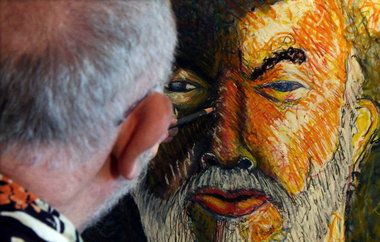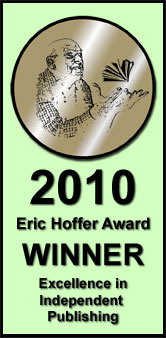MENTAL ILLNESS DOES NOT DEFINE ME
I refuse to be defined as mentally ill. It is not my vocation. I am someone who has a mental illness, but that doesn’t define who I am. It is a condition of who I am. I am an artist, an architect, and an author, and I have dealt with my bipolar disorder for most of my life. I see myself with three vocations, all of which have been shaped by the bipolar 1 condition and sometimes misshapen by that experience. Bipolar dysfunction has caused me significant problems in the past and could create problems now and in the future if I am not vigilant.
Before I knew I had this condition, I thought my problems of cynicism, extreme risk taking, grandiosity, trouble holding a job, and cyclical depression were caused by external factors.
My childhood wasn’t great. My mother was taken from me by my grandparents. I was placed temporarily in a foster home for being undisciplined and there was raped by older boys. My father remarried and gave his attention to his new family with two daughters. He was distant, he never encouraged me, and he was unable to handle a difficult son. Distracted and dyslexic, I acted out in school. I remember very clearly that in elementary school, I was sent to the principal’s office after I tried to stab the teacher with a pencil. I was forced to write my name many times right-handed on a blackboard. The lettering was crooked and smudged on purpose. My parents were called in. The principal called me a disturbed child.
Old fashioned, the teacher had tried to make me right-handed. She would take the pencil from my left hand, saying that making the alphabet legible, writing my name clearly, and not smudging the result were required to be successful in the future. Therefore, I needed to learn writing with my right hand. She repeated this requirement many times and finally, exasperated by my stubborn refusal to comply with her command, she took my left arm, placed it behind my back, and jammed the pencil in the right hand. When the teacher moved on to patrol the second row of students, I switched back to holding the pencil in my left hand and scribbled a text that I alone could decipher. With my hand curled over the letters as many left-handed students did, I tried to make the letters not messy, but failed. The teacher came up behind me and moved to grab the pencil out of my hand. I resisted, then attempted to stab her in her hand. I was an angry child, an even angrier teenager, and a very angry adult. I trusted no one in authority.
In young adulthood and attending college, I attempted suicide after failing all classes. In those early years, while extremely drunk I would do crazy things like cutting off the tip of my index finger with a sharpened jack knife, sinking a fire axe into a dormitory door, or on a dare jumping out a third-floor window into a big snowbank below. I eventually became aware of my tendency to enormous energy and fearlessness followed by a period of severe depression. Attributing my volatile behavior to the loss of my mother, whom I loved dearly, and who mysteriously and silently was erased from my life by my father and his family, I said to the psychiatrist, who was treating me after my doctor and my wife insist I get help for my cocaine addiction by putting myself in a mental hospital, that my problems were because of a crummy childhood. The psychiatrist said to me, that perhaps some of my issues could be attributed to this source, but she encouraged me to look at the evidence of my behavior, stating that I exhibited the classic characteristics of bipolar disorder. She said her psychiatric evaluation concluded that
these characteristics were a function of an inherent disposition, which was biologically based. I read up on the traits and discovered I had most of them. This recognition was the beginning of learning how to deal with the issues of bipolar disorder.
Looking at my history, I came to accept that I am bipolar. Through medication, therapy, and support groups, I emerged from the all-encompassing illness stage of my disorder. I wrote a book, “Bipolar Bare,” about my life’s journey with mental illness. I created the website www.bipolarbarebook.com, wrote articles about the bipolar condition, and spoke at public events on the subject all over the United States. This continued for a long time until I realized I neither wanted to be defined by bipolar disorder, nor could it provide the kind of career I wanted for myself. I was more than simply defined as a “survivor” of what can be a deadly illness, nor did I desire to be personality in the show about recovery. I began to see bipolar as an aspect underlying my life but not the be-all of it. I was much more than the description of mental illness. I stopped writing articles and public speaking. I had other things I liked to do that gave me pleasure and that created a persona that lies outside the characterization of mental illness. Because of this conclusion, this article is the first writing I have done in many years on my bipolar disorder.
To say I am cured of bipolar disorder would be a lie. What I can say is that it no longer controls my behavior. I still get depressed and even fall victim to suicidal ideation when the events in my existence are not favorable. However, I am on guard against falling victim to pessimism. I know the signs that tell me I when need to tread carefully. Getting too depressed, or finding myself thinking life is not worth living, I know I can come up and out from this abyss, this depression, in my mental landscape, given time. I need to hang on and will get beyond this glitch. I always have. And for me, I look to the calendar because any week, or any month, some minor disturbances or mini manifestations of excess energies or serious torpor can occur in my cycle of ups and downs. I can handle this by meditating, resting, doing things I love, and avoiding stressors like confronting rude behavior, too much traffic, or too much bad news. I also know that after a lifetime of experiences — at 78 years old, I marvel at how long I have lasted– the cycle of excitement and disillusion will continue but may be not as severe as previously. I know without fail that I must be ready to deal with two major downs each year. The first I attributed to a combination of biology and circumstance from the time my mother was taken from me, and I was raped. This down comes in late January. Never knowing what day it will occur, but once it hits, I know what it is, and how to guard myself. The second comes sometime in September, which like the first I believe is also a compound of biology and circumstance. It is the time of starting school. Going to school and college were difficult. I thought myself stupid and uncontrollable. Perhaps it is an unconscious reliving of the time I wanted to kill my teacher.
I take refuge in my love of the creative arts. I love to draw, to write, and to design. While I am not famous, I think of all the great artists who have preceded me. Da Vinci and van Gogh were thought to be bipolar. Van Gogh unfortunately gave into his condition and shot himself, while da Vinci lived to be an old man in his time of the Renaissance. The poet Robert Lowell had mental illness and was hospitalized several times for his depression, but he would reappear to write great verse. What I encourage for others is that no matter what your passion in life is — to be a chef, a musician, a gardener, or any other great life desire– that you follow your heart. You are not your illness. It is a condition to be watchful of, and to know yourself in a way many people do not. You can survive the non-fatal setbacks of life and the misfortunes you give to yourself. Cherish the good that lies within the mess of life.





